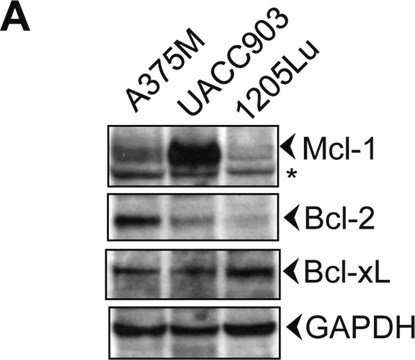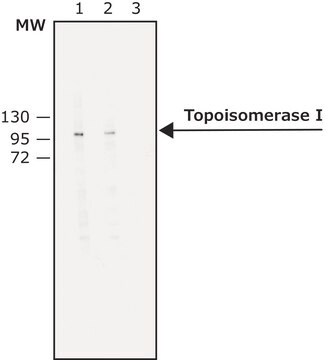MABE1084
Anti-Topoisomerase I-DNA Covalent Complexes Antibody, clone 1.1A
clone 1.1A, from mouse
동의어(들):
Topoisomerase I-DNA covalent complex, DNA topoisomerase 1-DNA covalent complex, Topo I-DNA covalent complex, TopoI cc, TopoIcc
로그인조직 및 계약 가격 보기
모든 사진(4)
About This Item
UNSPSC 코드:
12352203
eCl@ss:
32160702
NACRES:
NA.41
추천 제품
생물학적 소스
mouse
Quality Level
항체 형태
purified antibody
항체 생산 유형
primary antibodies
클론
1.1A, monoclonal
종 반응성
human, mouse
기술
ELISA: suitable
dot blot: suitable
flow cytometry: suitable
immunocytochemistry: suitable
동형
IgG2bκ
NCBI 수납 번호
UniProt 수납 번호
배송 상태
wet ice
타겟 번역 후 변형
unmodified
유전자 정보
human ... TOP1(7150)
일반 설명
DNA topoisomerase 1 (EC 5.99.1.2; UniProt P11387; also known as DNA topoisomerase I, Topo I) is encoded by the TOP1 (also known as TOPI) gene (Gene ID 7150) in human. Topo I relaxes double strand DNA (dsDNA) torsional strain by nicking one strand of the dsDNA to allow rotation of the nicked 3′-hydroxy end around the unnicked strand, while the 5′-phosphoryl end of the nicked DNA forms a covalent phosphodiester bond with a tyrosine residue on Topo I. The nicked 3′-hydroxy end then attacks the DNA-enzyme phosphoester bond to religate the nicked DNA strand. One supercoil is removed during each round of Topo I-catalyzed nicking and resealing. Camptothecins are widely used for cancer treatment, these drugs intercalate into DNA at the topo I active site, inhibiting the religation step of the enzyme and shifting the equilibrium toward covalent topo I-DNA complexes rather than free topo I and DNA. Interaction of these drug-stabilized covalent topo I-DNA complexes with advancing replication forks or transcription complexes causse further DNA damage and eventual cell death.
특이성
Clone 1.1A specifically recognizes topoisomerase I (Topo I) in DNA covalent complexes, but not non-DNA complexed, free Topo I by detecting topo I active site Tyr723 phosphorylation (Patel, A.G., et al, (2016). 44(6):2816-2826).
면역원
Epitope: Topo I pTyr723.
KLH-conjugated linear peptide corresponding to human Topo I target site sequence with phosphorylated Tyr723.
애플리케이션
Anti-Topoisomerase I-DNA Covalent Complexes Antibody, clone 1.1A is an antibody against Topoisomerase I-DNA Covalent Complexes for use in Immunocytochemistry, Flow Cytometry, Dot Blot, ELISA.
Flow Cytometry Analysis: 1.0 µg of this antibody from a representative lot detected topoisomerase I/DNA covalent complexes in Topotecan-treated HCT116 human colon cancer cells.
Immunocytochemistry Analysis: 10 µg/mL from a representative lot detected topoisomerase I/DNA covalent complexes in Topotecan-treated A549 human lung carcinoma cells (Courtesy of Dr. Scott H. Kaufmann, Mayo Clinic, Rochester, MN).
Flow Cytometry Analysis: 10 µg/mL from a representative lot detected topoisomerase I/DNA covalent complexes in Topotecan-treated HCT116 human colon cancer cells (Courtesy of Dr. Scott H. Kaufmann, Mayo Clinic, Rochester, MN).
Dot Blot Analysis: A representative lot detected the Topotecan-/TPT-stablized topoisomerase I/DNA covalent complexes, but not free topoisomerase I (non-DNA complexed) by slot blot using CsCl2 gradient-fractionated lysates from TPT-treated and untreated A549 cells (Patel, A.G., et al, (2016). 44(6):2816-2826).
Dot Blot Analysis: A representative lot detected a Topotecan (TPT) dose-dependent increase of TPT-stabilized topoisomerase I/DNA covalent complexes in lysates from TPT-treated A549 and HCT116 cells by slot blot (Patel, A.G., et al, (2016). 44(6):2816-2826).
Dot Blot Analysis: A representative lot detected stabilized topoisomerase I/DNA covalent complexes in lysates from A549 cells treated with Camptothecins (CPT, SN-38, TPT) or Indenoisoquinolines (NSC 314622, NSC 725776, NSC 743400), but not nucleoside analogues (cytarabine and gemcitabine) (Patel, A.G., et al, (2016). 44(6):2816-2826).
ELISA Analysis: A representative lot detected the immunogen peptide corresponding to topoisomerase I active site sequence with phosphorylated Tyr723, but not the peptide with non-phosphorylated Tyr273 by direct (non-sandwich) ELISA (Patel, A.G., et al, (2016). 44(6):2816-2826).
Immunocytochemistry Analysis: A representative lot detected a dose-dependent increase of non-nucleolar topoisomerase I/DNA covalent complex loci in Topotecan-/TPT-treated A549 cells, while the small number of loci in untreated cells were seen only in nucleoli (Patel, A.G., et al, (2016). 44(6):2816-2826).
Immunocytochemistry Analysis: A representative lot detected a temporally and spatially distinct nuclear loci formation of topoisomerase I/DNA covalent complexes from those of phospho-H2AX and Rad51 in Topotecan-/TPT-treated A549 cells (Patel, A.G., et al, (2016). 44(6):2816-2826).
Immunocytochemistry Analysis: 10 µg/mL from a representative lot detected topoisomerase I/DNA covalent complexes in Topotecan-treated A549 human lung carcinoma cells (Courtesy of Dr. Scott H. Kaufmann, Mayo Clinic, Rochester, MN).
Flow Cytometry Analysis: 10 µg/mL from a representative lot detected topoisomerase I/DNA covalent complexes in Topotecan-treated HCT116 human colon cancer cells (Courtesy of Dr. Scott H. Kaufmann, Mayo Clinic, Rochester, MN).
Dot Blot Analysis: A representative lot detected the Topotecan-/TPT-stablized topoisomerase I/DNA covalent complexes, but not free topoisomerase I (non-DNA complexed) by slot blot using CsCl2 gradient-fractionated lysates from TPT-treated and untreated A549 cells (Patel, A.G., et al, (2016). 44(6):2816-2826).
Dot Blot Analysis: A representative lot detected a Topotecan (TPT) dose-dependent increase of TPT-stabilized topoisomerase I/DNA covalent complexes in lysates from TPT-treated A549 and HCT116 cells by slot blot (Patel, A.G., et al, (2016). 44(6):2816-2826).
Dot Blot Analysis: A representative lot detected stabilized topoisomerase I/DNA covalent complexes in lysates from A549 cells treated with Camptothecins (CPT, SN-38, TPT) or Indenoisoquinolines (NSC 314622, NSC 725776, NSC 743400), but not nucleoside analogues (cytarabine and gemcitabine) (Patel, A.G., et al, (2016). 44(6):2816-2826).
ELISA Analysis: A representative lot detected the immunogen peptide corresponding to topoisomerase I active site sequence with phosphorylated Tyr723, but not the peptide with non-phosphorylated Tyr273 by direct (non-sandwich) ELISA (Patel, A.G., et al, (2016). 44(6):2816-2826).
Immunocytochemistry Analysis: A representative lot detected a dose-dependent increase of non-nucleolar topoisomerase I/DNA covalent complex loci in Topotecan-/TPT-treated A549 cells, while the small number of loci in untreated cells were seen only in nucleoli (Patel, A.G., et al, (2016). 44(6):2816-2826).
Immunocytochemistry Analysis: A representative lot detected a temporally and spatially distinct nuclear loci formation of topoisomerase I/DNA covalent complexes from those of phospho-H2AX and Rad51 in Topotecan-/TPT-treated A549 cells (Patel, A.G., et al, (2016). 44(6):2816-2826).
Research Category
Epigenetics & Nuclear Function
Epigenetics & Nuclear Function
Research Sub Category
Chromatin Biology
Chromatin Biology
품질
Evaluated by Immunocytochemistry in Topotecan-treated A549 human lung carcinoma cells.
Immunocytochemistry Analysis: 10 µg/mL of this antibody detected topoisomerase I/DNA covalent complexes in Topotecan-treated A549 human lung carcinoma cells.
Immunocytochemistry Analysis: 10 µg/mL of this antibody detected topoisomerase I/DNA covalent complexes in Topotecan-treated A549 human lung carcinoma cells.
표적 설명
90.7 kDa calculated.
물리적 형태
Format: Purified
Protein G purified.
Purified mouse IgG2bκ in buffer containing 0.1 M Tris-Glycine (pH 7.4), 150 mM NaCl with 0.05% sodium azide.
저장 및 안정성
Stable for 1 year at 2-8°C from date of receipt.
기타 정보
Concentration: Please refer to lot specific datasheet.
면책조항
Unless otherwise stated in our catalog or other company documentation accompanying the product(s), our products are intended for research use only and are not to be used for any other purpose, which includes but is not limited to, unauthorized commercial uses, in vitro diagnostic uses, ex vivo or in vivo therapeutic uses or any type of consumption or application to humans or animals.
적합한 제품을 찾을 수 없으신가요?
당사의 제품 선택기 도구.을(를) 시도해 보세요.
Storage Class Code
12 - Non Combustible Liquids
WGK
WGK 1
Flash Point (°F)
Not applicable
Flash Point (°C)
Not applicable
시험 성적서(COA)
제품의 로트/배치 번호를 입력하여 시험 성적서(COA)을 검색하십시오. 로트 및 배치 번호는 제품 라벨에 있는 ‘로트’ 또는 ‘배치’라는 용어 뒤에서 찾을 수 있습니다.
Shih-Chieh Chiang et al.
Science advances, 3(4), e1602506-e1602506 (2017-05-17)
Breakage of one strand of DNA is the most common form of DNA damage. Most damaged DNA termini require end-processing in preparation for ligation. The importance of this step is highlighted by the association of defects in the 3'-end processing
Angela M Mabb et al.
PloS one, 11(5), e0156439-e0156439 (2016-05-28)
Topoisomerase 1 (TOP1) inhibitors, including camptothecin and topotecan, covalently trap TOP1 on DNA, creating cleavage complexes (cc's) that must be resolved before gene transcription and DNA replication can proceed. We previously found that topotecan reduces the expression of long (>100
Amy Flor et al.
Cell chemical biology, 28(6), 776-787 (2020-12-23)
Topoisomerase 1 (Top1) reversibly nicks chromosomal DNA to relax strain accumulated during transcription, replication, chromatin assembly, and chromosome condensation. The Top1 poison camptothecin targets cancer cells by trapping the enzyme in the covalent complex Top1cc, tethered to cleaved DNA by
Syed Moiz Ahmed et al.
PloS one, 14(5), e0215696-e0215696 (2019-05-09)
The transient build-up of DNA supercoiling during the translocation of replication forks threatens genome stability and is controlled by DNA topoisomerases (TOPs). This crucial process has been exploited with TOP poisons for cancer chemotherapy. However, pinpointing cellular determinants of the
Laetitia Mouly et al.
Cell death & disease, 9(9), 931-931 (2018-09-14)
RHO GTPases regulate essential functions such as the organization of the actin cytoskeleton. The classic members cycle between an active GTP-bound and an inactive GDP-bound conformation whereas atypical members are predominantly GTP-bound. Besides their well-established role, the classic RHO GTPases
자사의 과학자팀은 생명 과학, 재료 과학, 화학 합성, 크로마토그래피, 분석 및 기타 많은 영역을 포함한 모든 과학 분야에 경험이 있습니다..
고객지원팀으로 연락바랍니다.




